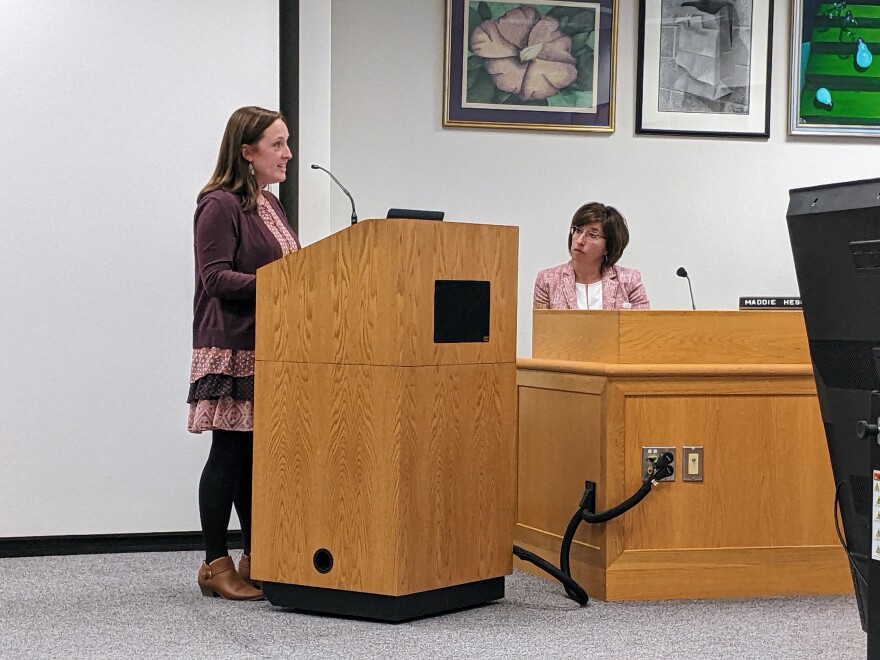EMMAUS, Pa. — East Penn Schools Superintendent Kristen Campbell on Monday walked the school board through a plan to add seven full-time reading comprehension interventionists to elementary schools at a cost of $800,000.
Also at the meeting, middle schools administrators told the board that a study of the schools' grading and reporting practices showed it should move to trimesters.
- The school board heard proposals to hire seven reading interventionists for elementary school students in the 2023-24 school year
- These positions were previously paid for via ESSER funding from the state, with administrators pointing to their benefit to the students' learning
- The board also saw presentations for a trimester schedule at both district middle schools and updates to home education policies
Administrators from Eyer Middle School and Lower Macungie Middle School recommended bringing the grading policies in line by adopting a trimester grading schedule.
Board members had many questions for the proposals in a meeting that lasted more than three hours.
New 2023-24 school year priorities
In the first of two scheduled budget priority presentations for the next school year, Campbell told the board the interventionists would give additional educational support to students in grades K-3 who are behind their grade's reading level.
The specialists would establish support during consistent intervention blocks of time for students and small group instruction during core reading instruction, working with about 55 students daily.
Campbell and others repeatedly emphasized the third grade benchmark of reading comprehension attainment as important, given the significantly improved education outlook for those who achieve proficiency by that point as opposed to those who don't.
Ninety-two percent of pupils improved reading performance following work with an interventionist in a study of East Penn students from fall 2022 to winter 2023.
The third grade cohort, the group of students whose final trimester of kindergarten was interrupted by the onset of the coronavirus pandemic, saw just a modest increase from 46% to 48% of pupils being at or above the grade benchmark for reading. But high-risk reading deficiencies decreased 7%, from 22% to 15%.
Other grades saw more marked success with the interventionists, such as kindergarten increasing from 44% to 68% of pupils reading at or above the set grade benchmark.
Images were shared to inform the board of what a "day in the life of an interventionist" is like at Jefferson Elementary School, which can be seen in the presentation:
"Mrs. (Julie) Zappile's position (as reading interventionist) is possibly the most important position in Jefferson Elementary school right now," Jefferson Principal Sam Hatner said.
"Especially coming back from the pandemic, trying to get back on our feet and trying to close those gaps from when we were home or from when we were hybrid."
The school has employed 10 reading interventionists in the district's elementary schools over the past year and a half, supported by the Elementary and Secondary School Emergency Relief program program of federal COVID-19 relief funds.
The largest elementary schools — Shoemaker, Willow Lane and Macungie — had two interventionists on staff, which would be reduced to one under the current proposal.
Campbell said that while based on PSSA scores for third-graders the district was ahead of the state average (64% vs. 52%), the use of the professionals would let them get closer to the goal of all students becoming proficient readers by the end of third grade.
"Having individuals, highly trained professionals, in our building who have an expertise in research based reading practices is critical to help us achieve that goal."East Penn Schools Superintendent Kristen Campbell
"Having individuals, highly trained professionals, in our building who have an expertise in research based reading practices is critical to help us achieve that goal," Campbell said.

Campbell said she hopes additional ESSER fund availability would let them support the presence of middle school level interventionists for an additional year. Currently, the district employs three math and three reading interventionists.
She said other districts have implemented similar positions, and the use of ESSER funds to support interventionists let faculty see the benefit of their presence on student learning.
In addition, she said it would create a proactive model for putting supports in place and potentially identifying special needs earlier.
Many on the board asked for more data from other elementary schools and comparisons to past pre-pandemic years so the benefit of retaining the positions permanently is demonstrated, but spoke optimistically to the benefit it can have.
The presenters also encouraged continuing to update reading comprehension education strategies toward the findings of recent research on the topic, including offering parent workshops on instructional shifts to support efforts at home.
On April 24, the school board will discuss using $900,000 for elementary and secondary school special education staffing and $50,000 for ESL and education alternatives, which Campbell said together with the interventionists comes out to about 1% of the budget for the following year, at $1,750,000

Funding for the initiatives would be completely covered by the proposed 3.92% tax rate increase discussed at prior budget hearings.
Remaining budget presentations include:
- April 24: Priority presentations No. 2.
- May 8: Presentation and adoption of the proposed final budget
- May 22: Presentation of budget updates and discussion of final budge
- June 12: Presentation and adoption of the final budget
A proposal to bring the middle school schedules in sync
Principal Sallie Yencho and instructional support specialist Dennine Leschinsky from Lower Macungie Middle School and Principal Tom Ruhf and instructional support specialist Susan Bower from Eyer Middle School joined forces as representatives of the district's middle level grading and reporting committee.
Staff of both schools joined as part of a process dating to 2015, when Eyer Middle School began a pilot program in which grading for a course ran the entire year rather than being divided into semesters or trimesters.
Following a 2019 survey to students and work on the initiative being put on hold by COVID and further surveying, the committee now recommends the two middle schools adopt a trimester schedule of 62 instructional days per period, vs. the 47 days that results from a quarterly system.

The presenters argue that would allow for more time to devote to curriculum, and could open up opportunity for more long-form writing assignments and project-based assessment. For faculty, that would allow more time to provide in-depth feedback.
"When we did our research and talked to a lot of the teachers and read the information, we were saying a happy medium for students was the teachers going from a year-long grading system to trimesters, where they still have longer periods of time" to grade, Yencho said.
"It does allow during that time chunk for teachers to work one-on-one with students with writing, which a lot of students are asking for."
Trimesters are currently used in district middle schools while Emmaus High School uses a quarterly grading system.
Continuous yearlong grading was not recommended, as it never allowed for a fresh start or reset throughout the year, and resulted in inconsistent reassessment procedures.
Through surveying, the administrators said they found both students and families are seeking more feedback from teachers about assessment scores.
No action was taken by the board following the presentation, with discussion on the proposal to continue in the future.
Other happenings & home education policy changes introduced
All Lehigh Valley students are welcome to the East Penn Education Foundation's Career Exploration Fair on Tuesday, March 28
Emmaus High School's performance of the stage play "Fiddler on the Roof" will be in the high school auditorium at 7 p.m. Thursday, March 29, through Sunday, April 1, with 2 p.m. matinees on Saturday and Sunday.
The board also introduced various changes for district policies related to its home education program, including letting home education program students participate in district co-curricular activities at the school building they would be assigned if enrolled, allowing participation in career and technical education programs offered by the district and in district academic courses equaling up to a quarter of the typical full time student school day.
That's is in addition to the already-established ability for those students to participate in extracurricular activities and interscholastic athletic programs per certain district guidelines.
The changes to the district policy likely will face more adjustments before a second and third reading and potential adoption.


